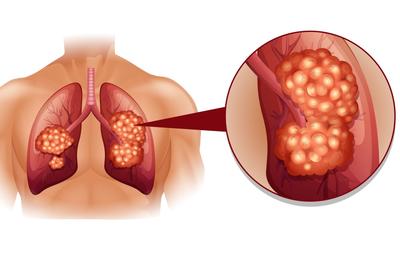
Diagnosed with Cancer? Your two greatest challenges are understanding cancer and understanding possible side effects from chemo and radiation. Knowledge is Power!
Learn about conventional, complementary, and integrative therapies.
Dealing with treatment side effects? Learn about evidence-based therapies to alleviate your symptoms.
Click the orange button to the right to learn more.
- You are here:
- Home »
- Blog »
- Lung Cancer »
- Re-Sensitize, Enhance Sensitivity of Lung Cancer to Chemotherapy
Re-Sensitize, Enhance Sensitivity of Lung Cancer to Chemotherapy

Curcumin sensitizes lung cancer (LC) to cisplatin, disulfiram re-sensitizes lung cancer to cisplatin- both non-conventional therapies increase the efficacy of lung cancer to cisplatin…
Einstein supposedly said that the definition of insanity is to do the same thing over and over again expecting a different result. My experience is that conventional oncology approaches lung cancer the same way over and over expecting a different result.
Consider thinking outside the conventional oncologic box.
Two of the articles below talk about evidence-based, non-conventional therapies- disulfiram and curcumin– that can enhance the anti-LC action of a standard-of-care LC chemotherapy regimen called cisplatin.
My point is that it makes sense to utilize surgical removal of as much of your LC as you can. Fine. It is the standard-of-care to then follow LC surgery with cisplatin. But too many lung cancer patients relapse after cisplatin therapy to not want to do something different.
Consider adding disulfiram and curcumin to your therapy plan.
I am a cancer survivor and cancer coach. It is my experience that cancer patients facing an aggressive, complicated cancer like lung cancer must enhance their standard-of-care therapies with evidence-based, non-conventional help.
I have remained in complete remission from my “incurable” cancer since ’99 by living an evidence-based, non-conventional, anti-cancer lifestyle. I supplement with Life Extension Super-Bio Curcumin because this brand of curcumin has been evaluated and approved by Consumerlab.com. Further this brand of curcumin has been shown to be much for bioavailable aka absorbed in the blood stream.
Have you been diagnosed with lung cancer? Please scroll down the page, post a question or comment and I will reply to you ASAP.
Thank you,
David Emerson
- Cancer Survivor
- Cancer Coach
- Director PeopleBeatingCancer
Recommended Reading:
Alcohol Addiction Therapy Resensitizes Resistant NSCLC to Chemotherapy
“Scientists in Ireland have shown how a drug that has been prescribed for 60 years to treat alcohol addiction can also resensitize treatment-resistant non-small-cell lung cancer (NSCLC) to chemotherapy.
The drug, disulfiram—also known as Antabuse—blocks aldehyde dehydrogenase (ALDH), which is a key enzyme involved in metabolizing alcohol, but is also involved in early stem cell differentiation…
“Disulfiram is an already approved drug with well-tolerated side effects, which can be taken orally,” Dr. Barr stated. “Its potential use may give chemotherapeutic drugs such as cisplatin a new lease of life in the treatment of resistant lung tumors…
NSCLC is the most common form of lung cancer, but exhibits low treatment response rates and poor overall prognosis because tumors develop resistance to chemotherapeutic agents, including cisplatin…
The in vitro studies by Barr’s team first showed that cisplatin-resistant NSCLC cell lines contain subpopulations of cells that exhibit high ALDH1 activity and display stem-like characteristics.
Exposing nonresistant lung cancer cell lines to cisplatin for a period of weeks led to increased chemotherapy resistance and the emergence of ALDH1-positive cell subpopulations that exhibited stem cell characteristics. These findings supported the team’s hypothesis that lung cancer cells exposed to cisplatin for prolonged periods “enrich for a subpopulation of ALDH1+ve cells with stem-like characteristics, which may, at least in part, account for the resistance phenotype exhibited by these cells.”
The researchers next treated cisplatin-resistant tumor cells with cisplatin and a chemical known as diethylaminobenzaldehyde (DEAB), which blocks ALDH1. The addition of DEAB rendered the cells more susceptible to cisplatin, leading to reduced cancer proliferation and survival due to cisplatin-induced apoptosis. In a subsequent set of experiments, cisplatin-resistant lung cancer cell lines were treated using cisplatin plus the FDA-approved ALDH1 inhibitor disulfiram. The results were similar to those using DEAB. Effectively, disulfiram boosted the antiproliferative and proapoptotic effects of cisplatin therapy.
“As disulfiram is an FDA-approved drug, it represents an important drug for testing the proof-of-principle of ALDH inhibitors as CSC targeting agents in cisplatin resistant NSCLC,” the authors suggest in their paper.
“The development of novel anti-cancer drugs against various malignant tumors is both time-consuming and expensive and involves pre-clinical and clinical testing,” added co-author Lauren MacDonagh, Ph.D.
“Finding new uses for existing drugs, otherwise known as ‘repurposing,’ may allow for new uses of an old drug that may lead to the discovery of new treatments.” Such repurposing is a proven short cut between the research laboratory and the clinic. Repurposing disulfiram for cancer therapy would be particularly useful, as the drug can be taken orally, and can also penetrate the blood–brain barrier, for potential use against metastases.
Disulfiram
“When disulfiram creates complexes with metals (dithiocarbamate complexes), it is a proteasome inhibitor[10] and can represent a new approach to proteasome inhibition and a clinical trial of disulfiram as adjuvant against lung cancer is happening in Israel (ClinicalTrials.gov Identifier: NCT00312819).”
Curcumin sensitizes lung cancer cells to cisplatin-induced apoptosis through superoxide anion-mediated Bcl-2 degradation.
“The purpose of this study was to investigate the sensitizing effect of curcumin on cisplatin-induced apoptosis in non-small cell lung cancer (NSCLC) H460 cells.
Curcumin was shown to induce superoxide anion generation, down-regulate anti-apoptotic Bcl-2 protein, and subsequently sensitize cells to cisplatin-induced apoptosis. Co-treatment of the cells with curcumin and cisplatin resulted in increased apoptosis and reversal of Bcl-2-mediated cisplatin resistance. The mechanism by which curcumin down-regulates Bcl-2 and sensitizes cells to cisplatin-induced apoptosis involves proteasomal degradation of Bcl-2.
These findings indicate a novel pathway for curcumin regulation of Bcl-2, which could benefit the development of a cisplatin sensitizing agent…”


